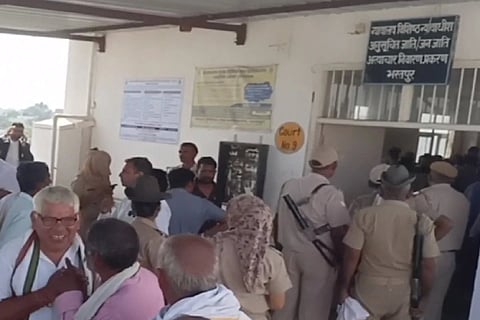
Jaipur: Jaipur bench of the Rajasthan High Court on March 20 suspended the life sentence awarded by a special SC/ST court to nine people in the Kumher massacre case. Hearing the appeal against the sentencing of all the convicts, a division bench of Justice Inderjit Singh and Justice Ashutosh Kumar ordered for their release.
Over 16 Dalits were killed and 44 injured by ‘upper’ caste people in a clash between them outside a cinema hall on June 6, 1992.
Thirty-one years after the infamous incident, the nine accused — Lakho, Prem Singh, Man Singh, Rajveer, Pritam, Paras Jain, Chetan, Shiv Singh alias Shibbo and Gopal — had been sentenced to life imprisonment, while 41 others were cleared of the charges on September 30, 2023.
The convicts had approached the High Court through their counsels, urging suspension of the punishment awarded to them by the trial court.
The defence argued that their clients were not named in the first information report (FIR) lodged by the Kumher police at the time of the incident. In addition, they submitted, no arms — which were used in the crime — were seized from the possession of the nine convicts during the investigation. Also, they were never made to undergo an identification parade — which indicated that the police had doubts about their role in the crime.
The defence said it is doubtful to recognize the convicts in a crowd of thousands of people and to know their names in the first place. Convinced with the submission, the court suspended the sentencing and ordered their release.
The three accused whose names had appeared in the chargesheet were let off by the trial court. Most of the witnesses in the case had turned hostile, and they told the court during cross examination that they had seen the accused for the first time.
It may be recalled that a dispute between the socially marginalised Jatavs and socially and economically influential Jats had led to the fatalities in Kumher. The investigation into the incident was carried out by the Central Bureau of Investigation (CBI), which had filed the chargesheet against 83 accused after recording statements of 283 witnesses.
Thirty-two accused passed away during the prolonged trial, while one is still on the run.
Advocate Satish Kumar, director of social organization Dalit Adhikar, said that on June 6, 1992, a mob of five to six thousand people attacked the Dalit settlement in Kumher, Bharatpur.
The CBI investigation — according to him — confirmed that hundreds of Dalit houses were set on fire because of hatred against the community, and women were disrespected by stripping them naked. Many people were burnt alive. Sixteen Dalits were killed in the incident. The CBI filed a challan against 83 people.
The relief to the convicts in the black and white case, he alleged, indicates failures and lack of seriousness on part of the prosecution. “Had there been proper advocacy, the culprits in this heinous murder case would not have gone unpunished and the Dalits would have got justice,” he told The Mooknayak.
Human rights lawyer Tarachand Verma said that the High Court has suspended the sentencing, not acquitted them.
“The appeal against the conviction is yet to be heard. After listening to both sides, the court will either uphold the trial court’s decision or overturn it. Only time will tell what will happen to the case, but it is now established the government measurably failed to present. Therefore, the prosecution from now on must pursue the matter strongly and with honesty to ensure that the culprits are not spared and the victims of the mass murder get justice,” he said.
On June 6, 1992, 16 people were killed in caste violence in Kumher town. While 11 deceased were identified on the spot, the identity of the remaining five bodies could not be ascertained. Forty-three had suffered serious injuries in the incident. While the mob had completely torched 120 houses owned by the Jatav community, 79 households were partially damaged. The case was first investigated by the state police and later, it was handed over to the CBI.
The massacre occurred in the summer of 1992. Clashes broke out between the two groups during a movie show in a local theatre. Cases were filed by the two sides at Kumher police station. The fight snowballed into serious clashes, which spread to nearby settlements.
According to the FIR registered by the police after the incident, some people had called a panchayat (a meeting of elders and influential people of a locality) on June 5 to fuel the fire and decided to teach the Dalits a lesson.
After the meeting, people gathered at one place on June 6 and attacked Dalit settlements with deadly weapons. The attackers set on fire their houses and huts. Their animals were also harmed. Sixteen men and women belonging to the socially outcasted community were murdered while trying to save their lives.
You can also join our WhatsApp group to get premium and selected news of The Mooknayak on WhatsApp. Click here to join the WhatsApp group.